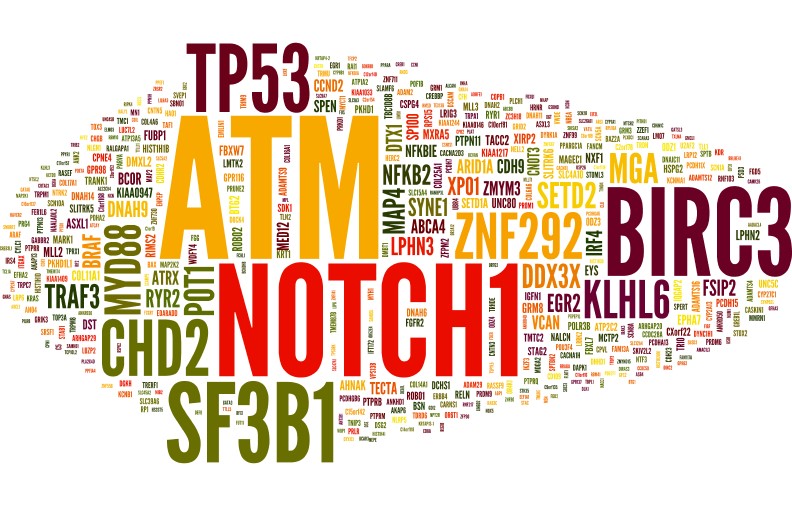Mutations in the dark side of the genome cause leukemia

The journal Nature has just published a study that marks a milestone in the understanding of chronic lymphocytic leukemia, the most common leukemia in adults, as the genomes of normal and tumor cells for more than 500 patients have been sequenced providing novel mechanisms involved in the development of this tumor. Cancer originates due to the progressive accumulation of mutations in the genome of normal cells. This is why seven years ago the International Cancer Genome Consortium (ICGC) was established. The main aim of this consortium was to sequence the genome of tumor cells from at least 500 patients, and do it for each of the 50 most frequent types of cancer in the world. The Spanish-led consortium in charge of the chronic lymphocytic leukemia study has been the first team to accomplish this ambitious objective. In this work —led by Elías Campo, professor of Pathological Anatomy from the University of Barcelona (UB) and researcher at Hospital Clínic and the August Pi i Sunyer Biomedical Research Institute (IDIBAPS), and Carlos López Otín, researcher at the University of Oviedo—, more than 60 researchers from different centers have collaborated to mine the three billion bases of each tumor genome in search of alterations responsible for the development of this disease.

The journal Nature has just published a study that marks a milestone in the understanding of chronic lymphocytic leukemia, the most common leukemia in adults, as the genomes of normal and tumor cells for more than 500 patients have been sequenced providing novel mechanisms involved in the development of this tumor. Cancer originates due to the progressive accumulation of mutations in the genome of normal cells. This is why seven years ago the International Cancer Genome Consortium (ICGC) was established. The main aim of this consortium was to sequence the genome of tumor cells from at least 500 patients, and do it for each of the 50 most frequent types of cancer in the world. The Spanish-led consortium in charge of the chronic lymphocytic leukemia study has been the first team to accomplish this ambitious objective. In this work —led by Elías Campo, professor of Pathological Anatomy from the University of Barcelona (UB) and researcher at Hospital Clínic and the August Pi i Sunyer Biomedical Research Institute (IDIBAPS), and Carlos López Otín, researcher at the University of Oviedo—, more than 60 researchers from different centers have collaborated to mine the three billion bases of each tumor genome in search of alterations responsible for the development of this disease.
Chronic lymphocytic leukemia is the most frequent leukemia in Western countries, with more than 12,000 new cases diagnosed in Europe every year. Knowing the genetic alterations present in a tumor is a fundamental step to understand cancer development and improve current treatments.
This study shows that each tumor accumulates more than three thousand mutations in its genome, but only a handful of them are relevant for tumor growth. “We have been able to define 60 different genes whose mutations cause tumor initiation and development”, says López Otín. “However, the most relevant finding of this study has been the identification of mutations in regions of the genome which do not code for proteins and whose functional relevance is still hardly known”.
Xose S. Puente, researcher at the University of Ovido and first author of the article, points out that “these regions represent 98% of our genome, but their functions are poorly understood, so they are not routinely analyzed in patients”. “In this work—he emphasizes—, we have shown that one in every five tumors originates due to mutations in the so called dark regions of the genome, and knowing this information is essential, as they have a clear impact on the prognosis of the disease”.
The study also reveals the impact of several mutations in the clinical evolution of the patients. “This work provides a comprehensive catalogue of the most important genetic alterations involved in the development of this leukemia”, affirms Elías Campo.
The Spanish Consortium for the Study of Chronic Lympyhocytic Leukemia Genome
The Spanish Consortium for the Study of Chronic Lymphocytic Leukemia Genome is funded by the Spanish Ministry of Economy and Competitiveness through the Institute Of Health Carlos III. It belongs to the International Cancer Genome Consortium. The results generated by this consortium are providing the grounds for the upcoming use of Precision Medicine initiatives worldwide. Thus, the increasing use of tumor genomic analysis will allow a better classification of patients, as well as better treatment decisions based on the type of genetic alterations present in the tumor. In fact, novel generations of drugs for chronic lymphocytic leukemia are approved for patients with specific genomic alterations, and this situation will become more common as the mutations which determine the response to specific drugs are identified. The study published today confirms the utility of genome sequencing to uncover the genetic causes of cancer and to identify novel mechanisms implicated in its development, as well as to define new therapeutic approaches for its treatment.
The Spanish-led consortium is composed by more than 15 institutions: Hospital Clinic de Barcelona, Institute of Oncology of the University of Oviedo, August Pi i Sunyer Biomedical Research Institute, University of Barcelona, Barcelona Supercomputing Center, Deusto University, National Centre for Genome Analysis (CNAG), University Hospital of Salamanca, Asturias Central University Hospital, Hospital Clínico de Valencia, Catalan Institute of Oncology, Centro de Investigación del Cáncer de Salamanca, National DNA Bank Spain, Centre for Genomic Regulation, and Spanish National Cancer Research Centre.
Article reference:
Puente, X. S.; Bea, S.; Valdés Mas, R.; López Otín, C.; Campo, E. et al. “Non-coding recurrent mutations in chronic lymphocytic leukaemia”. Nature, July 2015. doi:10.1038/nature14666
